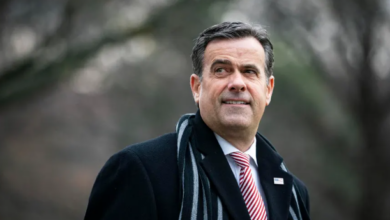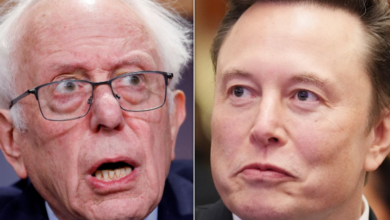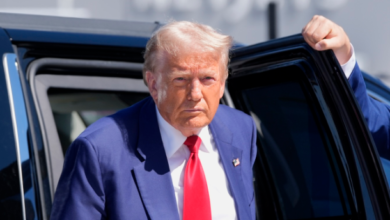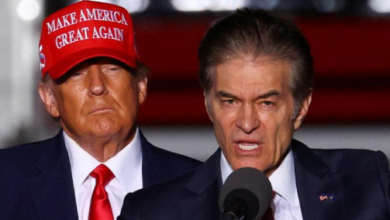Some Eligible Ex-Felons Fear Voting Because Of Ron DeSantis

When Florida Gov. Ron DeSantis (R) called a press conference in August to announce illegal voting charges against 20 Floridians with prior felony convictions ― all of whom seem not to have intentionally broken the law, but rather fallen victim to a confusing voter registration system ― a chill went over the state.
As a result, some would-be voters who actually are qualified to register, thanks to a constitutional amendment to restore former felons’ voting rights that Florida voters approved four years ago, are nevertheless passing on the opportunity because they’re worried they’ll go back to prison.
“We’ve already encountered other individuals who have said, ‘Look, I’m afraid to vote,’” said Mike Gottlieb, a Democratic state legislator who’s on the legal defense team for one of the men facing charges.
“I have not encountered in the past this many voters calling, concerned that they may be prosecuted or what-have-you for voter fraud,” Mark Earley, Leon County’s supervisor of elections, told News Service of Florida this week. “And these are all eligible voters that have contacted me.”
Gottlieb said he believed that DeSantis’ press conference, held in a courtroom in Florida’s bluest county, Broward, was “specifically designed to disenfranchise Democratic voters in Broward County” ― an accusation that a Florida Department of State spokesperson called “blatantly false.”
Nonetheless, news of the arrests quickly reverberated across the state.
“It’s had a major chilling effect,” Gottlieb said. “I think they’ve accomplished their goal. There are going to be people who are not interested in voting because they are concerned that they’re going to be arrested.”
Neil Volz said he has seen a similar response to the arrests. Volz is deputy director at the Florida Rights Restoration Coalition, a group dedicated to helping returning citizens ― that is, formerly incarcerated people ― who have prior convictions.
“We’re seeing individuals who, because of the confusion, might not participate this year,” said Volz, who is himself a returning citizen. “It’s gut-wrenching to think that the de facto decision somebody needs to make, when they’re confused about whether they’re eligible or not, is to not vote.”
“It’s gut-wrenching to think that the de facto decision somebody needs to make, when they’re confused about whether they’re eligible or not, is to not vote.”
– Neil Volz, deputy director, Florida Rights Restoration Coalition
‘There’s Your Defense’
After Florida’s Amendment 4 passed in 2018, former felons who’d completed any sentence, parole or probation for their convictions were automatically granted their voting rights back, with the exception of people convicted of murder or felony sexual offenses. But within months, the Republican-controlled Florida legislature additionally required felons to pay back all fines and fees related to their sentence before they could regain their rights ― forcing returning citizens to navigate a county-by-county patchwork of court records that can feel impossible to untangle.
In Alachua County earlier this year, months before DeSantis’ press conference, 10 Floridians were charged for voting illegally, although most of them had been registered to vote by county officials during a jailhouse registration drive. All of them owed fines and fees from previous charges, Fresh Take Florida reported. The evidence against one defendant included $494 in unpaid fines that dated as far back as 1994, according to Orlando Weekly.
There’s no evidence that any of the people who DeSantis mentioned in his August press conference actually meant to break the law. But all of the defendants DeSantis announced had been convicted of murder or felony sex offenses, making them ineligible for automatic voter restoration. Yet no one stopped them from registering.
Rather, the defendants say they were told by various parties ― election officials, canvassers, a probation officer and even a sheriff’s deputy ― that they were eligible to vote, according to court records reported by the Orlando Sentinel. They were issued voter registration cards by the state, and they used them. Months later, police officers arrived at their doors.
Body camera footage published by the Tampa Bay Times last week showed the moments the Floridians realized that they’d essentially been misled into thinking they were eligible to vote.
“I’m like, what the hell? Voter fraud?” Romona Oliver says in one of the videos. “I voted, but I ain’t commit no fraud.”
One of the officers arresting her seems similarly confused.
“That’s the thing, I don’t know exactly what happened with it, but you do have a warrant, and that’s what it’s for,” he says.
Another video shows Florida resident Nathan Hart telling officers that he’d been told, “If you can vote, then they’ll give you a card, and if you can’t vote, then they won’t.”
“There’s your defense,” an officer replies.
In another video, Tony Patterson stews in the back of a police car: “Why would you let me vote if I wasn’t able to vote?”
“I’m not sure, buddy,” an officer responds. “I don’t know.” Elsewhere, he says: “I’ve never seen these charges before in my entire life.”

“The ultimate responsibility to ensure compliance with the law lies with the voter, as local and state election officials are obliged to take the word of the voter on the voter application ― affirmations made under penalty of perjury,” Mark Ard, a spokesperson for the Florida Department of State, told HuffPost.
“These individuals lied when they registered to vote,” Ard said.
Out of 19 arrests made related to DeSantis’ press conference, 12 people were registered Democrats and at least 13 were Black, the Tampa Bay Times found. A New York Times review of 400 voter fraud charges nationwide over the past half decade found that “those who are poor and Black are more likely to be sent to jail than comfortable retirees facing similar charges.” This seems to hold true in Florida.
The defendants who were the subjects of DeSantis’ announcement face years behind bars ― a marked difference from four residents of The Villages, Florida’s largest retirement community, who were charged with voting twice. One of the Villages defendants awaits trial, but three others ― two Republicans and one unaffiliated voter, all of them white ― entered a pretrial diversion program that required them to earn at least a C grade in a 12-week adult civics course.
‘Criminalizing Voting’
At the press conference in August, DeSantis painted the prosecutions as an “opening salvo” against voter fraud, promising more prosecutions to come. (Only one other case has been charged since.)
And the late Pete Antonacci, who DeSantis had appointed head of his new Office of Election Crimes and Security, claimed without evidence that he was “certain” there had been “plenty of illegal ballots cast” in a recent Democratic primary.
Volz, of the FRRC, said the state could spend money on creating a system that actually works to check eligibility on the front end, rather than leaving voters in the dark and arresting people who mistakenly vote despite not being qualified.
“Instead of spending money fixing the front end of the system, we’re spending money on law enforcement and the court system, and we’re seeing people’s lives upended because of it,” he said. “The state responded to a broken system by criminalizing voting.”
So far, the prosecutions aren’t going well for the state. Last week, a Miami judge dismissed the case against Robert Lee Wood, one of the defendants announced at DeSantis’ press conference, because the alleged crime had been committed in just one county, meaning it ought to have been prosecuted by the local state attorney, not the Office of Statewide Prosecution.
“Local prosecutors probably wouldn’t take these cases, because the likelihood of conviction would be low at best,” Larry Davis, an attorney for Wood, told HuffPost.
The state has said it will appeal the case, but Davis said he was prepared to argue on the substance of his client’s actions: “He had no intent to break the law.”
Jonathan Olson, a supervisor in the state attorney’s office in Lake County, Florida, articulated the same concern this month while declining to take six cases in which the office had verified that ineligible voters had cast ballots.
According to state law, the Florida Division of Elections is required to notify local officials if someone is ineligible to vote, Olson wrote in a statement. But no such notice was given, and the individuals were mistakenly issued registration cards.
“The evidence fails to show willful actions on a part of these individuals,” Olson wrote. “Therefore, the State is unable to file charges.”
The state took the opposite route, sending a shock to hundreds of thousands of eligible Floridians with previous felony convictions who nonetheless haven’t yet registered to vote.
Ard said the Department of State receives daily reports of registered voters with potential felonies on their records, but that the process to screen whether the registrations pass muster is done manually.
“In sum, and as courts have noted, it is easy to be put on the rolls and difficult to be removed,” Ard said. “This is as it should be. Should Floridians wish to see this process changed, they should contact their legislative representative to change the current statutes.”
Volz said the atmosphere in Florida today reminds him of the days he spent campaigning for the passage of Amendment 4, a statewide vote of Floridians who still had their rights, to extend the franchise to those the state had excluded from society. Volz and other returning citizens couldn’t vote on the amendment themselves. Now, Floridians concerned about facing charges simply for voting are in the same situation.
“We are seeing some of this energy turned towards getting out the vote, and making sure that the voices of returning citizens are being heard ― even if it’s through their friends and neighbors and loved ones,” Volz said.
“To see that rebirth is really interesting,” he said. “It gives us hope.”
[ad_2]
Source link





